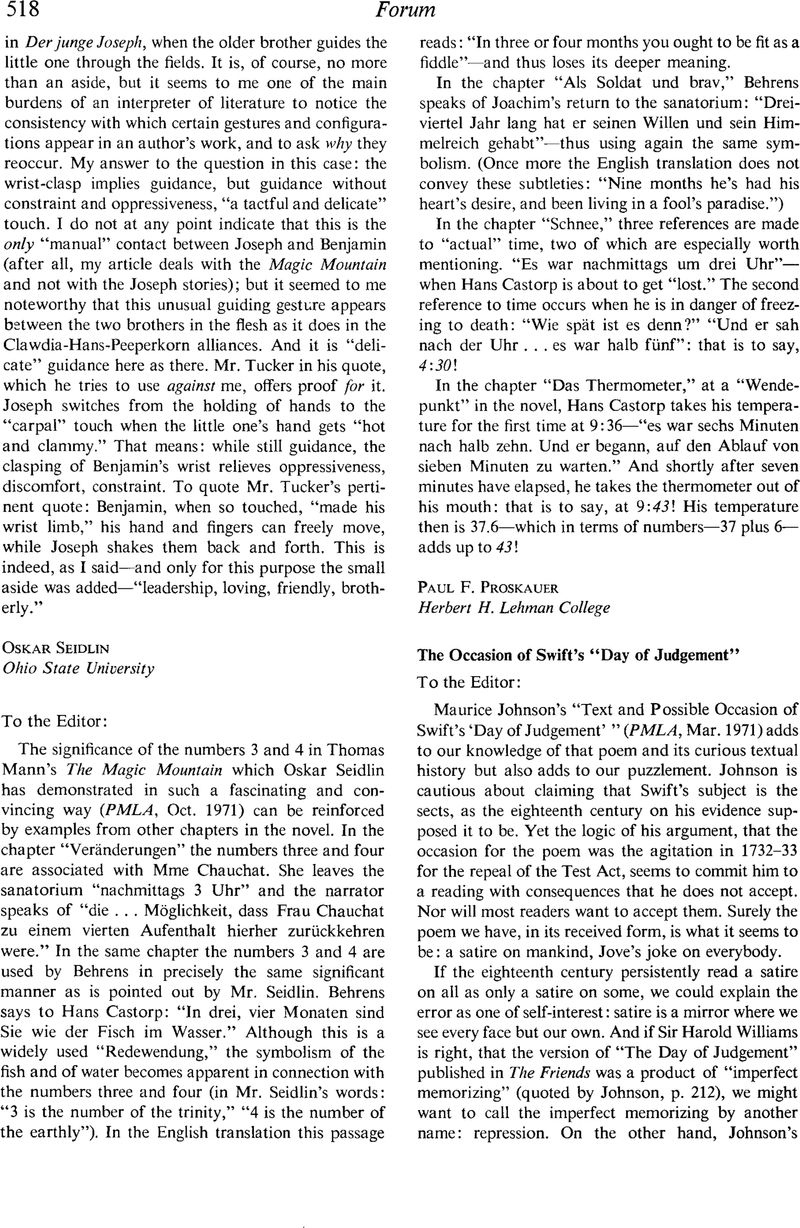Article contents
The Occasion of Swift's “Day of Judgement”
Published online by Cambridge University Press: 01 December 2020
Abstract

Information
- Type
- Forum
- Information
- Copyright
- Copyright © Modern Language Association of America, 1972
References
1 Edward Rosenheim has argued that satire is always occasional. My resistance to that view dwindles almost daily. See Swift and the Satirist's Art (Chicago: Univ. of Chicago Press, 1963).
2 Cf. T. O. Wedel's argument that the satire in Gulliver's Travels is aimed at theories of man's natural benevolence ; “On the Philosophical Background of Gulliver's Travels” SP, 23 (1926), 434–50.
3 See D. P. Walker, Thé Decline of Hell: Seventeenth-Century Discussions of Eternal Torment (Chicago : Univ. of Chicago Press, 1964).
4 In his abstract of Collins' Discourse Swift supposes, sardonically, that because “Moor and Tillotson deny the Eternity of Hell Torments, a Free Thinker may deny all future Punishments whatsoever” (The Prose Works of Jonathan Swift, ed. Herbert Davis, iv, Oxford : Basil Black-well, 1939–68, 35). D. P. Walker believes that in fact Moore “held to the orthodox doctrine of eternal torment,” though he was associated with others who did not (The Decline of Hell, p. 127).
5 Thomas Whittemore, The Modern History of Universal-ism, from the Era of the Restoration to the Present Time (Boston, 1830), p. 181.
6 The Enochian Walks with God (London, 1694), p. 17.
7 On the Philadelphians, see Walker, pp. 218–63. Also Nils Thune, The Behmenists and the Philadelphians (Uppsala: Almqvist & Wiksells, 1948).
8 Certainly he knew of the Camisards, or “French Prophets,” with whom the Philadelphians were briefly and somewhat incongruously associated. The enthusiastic doings of the Camisards scandalized London in 1706–07 (Walker, pp. 253–62). In Bickerstaff's predictions for June 1708, they are nicely dealt with: “This Month will be distinguished at home, by the utter dispersing of those ridiculous deluded Enthusiasts, commonly called the Prophets” (The Prose Works of Jonathan Swift, II, 146).
9 The Imperial Standard of Messiah Triumphant (London, [1727]), pp. 89–90, 90. Cf. Roach, The Great Crisis (London, 1725–27), p. 186: “the, Lamb, to the Children of Grace, shall appear in the Throne, Smiling thro' the Judge, and turning the Dispensation of Terror, tho' Smart indeed in the Preparation for and Ingredients of it, into a Jest or Holy Sport in the End.”
10 The Great Crisis, pp. 186–87.
11 In her Message to the Philadelphian Society (1696), according to the article “Philadelphians,” Encyclopedia of Religion and Ethics, ed. James Hastings (New York: Scribners, 1925), ix, 836–37.
12 Walker, p. 253.
13 E.g., Roach's plea to the established and dissenting churches to live peaceably together; The Great Crisis, pp. 55–88.
14 Massachusetts Review, 11 (1970), 312.
- 1
- Cited by

